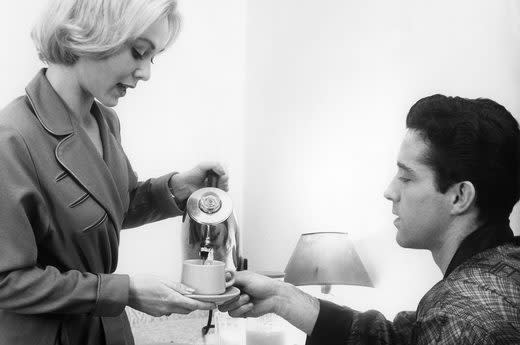5 Old Wives' Tales About Health and the Science Behind Them

“Don’t cross your eyes or they’ll get stuck!” (Photos: Classic Stock Images)
Did your mom ever warn you against venturing outside into the cold with wet hair? Or has your grandma scolded you for jumping into a pool less than 30 minutes after eating? When it comes to health, old wives’ tales abound. But are there kernels of truth to be found in them? And where do these seemingly far-fetched tales come from? Here are five common health-related old wives’ tales you might have heard growing up (or even into your adulthood) and the science behind them.
1. “Don’t Crack Your Knuckles – You’ll Get Arthritis.”
Knuckle-cracking is a nervous habit we could probably all do without. Caused by the collapse of gas bubbles in the fluid that cushions our joints, it’s highly addictive. According to 2011 study published in the Journal of the American Board of Family Medicine, between 25 and 54 percent of people have done it at one time or another.
Related: 7 Myths About Cholesterol Debunked
The good news: It won’t cause arthritis. Several studies report no link between arthritis and knuckle-cracking, including one testimony from a Nobel Prize-winning doctor who cracked the knuckles twice daily every day on one hand for 50 years to disprove his own mother. After 50 years, he reported no difference in his hands. However, cracking knuckles has been found to cause a few other problems, like swelling, weakened grip, the dislocation of tendons and ligament damage around the joint. So even if it doesn’t cause arthritis, it might be a good idea to give your knuckles a break.

2. “You Should Stay Out of the Pool for at Least 30 Minutes After Eating.”
There are few things more excruciating to a kid than snacking by a pool and then having to wait half an hour to jump back in. Yet moms everywhere made the wait a requirement for reentry. Turns out, there’s some truth to this old wives’ tale, but it’s not exclusive to swimming and depends on how much you’ve eaten.
Any form of strenuous exercise shortly after eating a big meal can cause a “stitch,” or a cramp in your stomach, shortly thereafter. “Exercising shortly after a big meal isn’t ideal because blood is drawn to your gut for digestion, which takes away from the working muscles,” says Darren Morton, senior lecturer at Avondale College of Higher Education in Australia and the world’s foremost researcher on “the stitch.” “The body is cleverly designed to help us remember this by giving a feeling of discomfort or pain when we eat too much and then attempt to perform exercise. In short, it is probably safe enough to go swimming after a meal, but it probably won’t be that enjoyable.”

3. “Coffee Will Stunt Your Growth.
”File this old wives’ tale under total malarkey. There doesn’t seem to be a single study to prove there’s even a kernel of truth in this old wives’ tale – with respect to children, anyhow. However, the USDA discourages serious caffeine consumption for children for other reasons. But coffee can provide many positive benefits for grown folks when consumed in moderation, such as protecting against Type 2 diabetes, easing Parkinson’s disease symptoms and promoting heart health. So unless you’ve been medically advised otherwise, go ahead and pour yourself a cup.

4. “Eat Fish – It’s Brain Food.”
In 2014, a group of scientists from UCLA published a study in the American Journal of Preventative Medicine, proving a weekly portion of baked or broiled fish was “positively associated” with grey matter in sections of the brain having to do with cognition and memory in the elderly – even without factoring in the already established brain enhancement contributed by omega-3 fatty acids found in fish.
Related: 7 Signs Your Gut Is Out of Whack
In an interview in The Atlantic, lead scientist Cyrus Raji, M.D., said eating fish (doesn’t matter what kind) even once weekly can make your hippocampus (the part of the brain responsible for memory and learning) larger by as much as 14 percent, an amazing finding, considering the population of those suffering from dementia is expected to double every 20 years – numbers that make the fish entree on any menu that much more appealing.

5. “The Flu Shot Gives You the Flu.”
A longstanding myth that makes the rounds each and every year, the idea that the flu shot gives you the flu is just that – a myth. Medical experts almost unanimously endorse the flu shot, claiming it’s the best line of defense against the potentially dangerous virus. Although the flu vaccine can have adverse side effects that mimic flu symptoms (like low-grade fever, headache and a sore throat) the Centers for Disease Control and Prevention says flu shots made with the flu viruses aren’t infectious because the virus is inactivated or the vaccine is made with no virus at all (which is the case for recombinant influenza vaccine). It takes about two weeks from exposure to come down with symptoms, so the earlier in the season you get your flu shot, the better armed you’ll be against the virus.
The original article “8 Old Wives’ Tales and the Science Behind Them“ appeared on LIVESTRONG.COM.
By Vivian Manning-Schaffel
More from LIVESTRONG.COM:
10 Most Common Fears & Ways to Overcome Them
